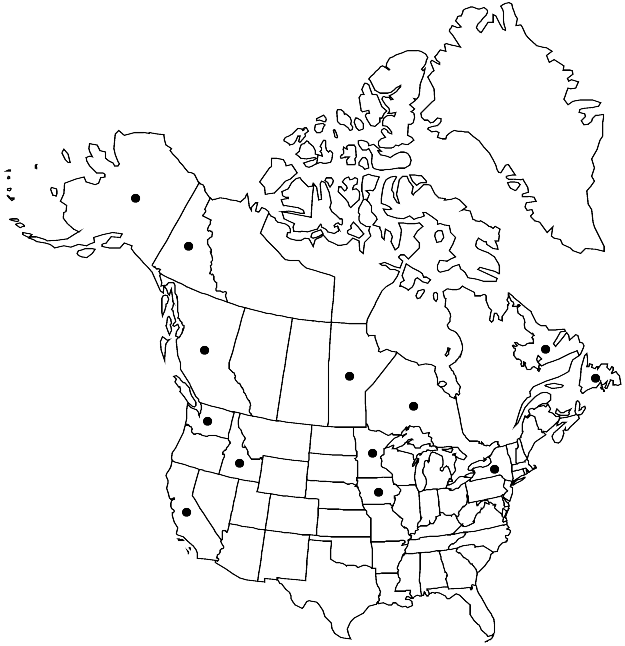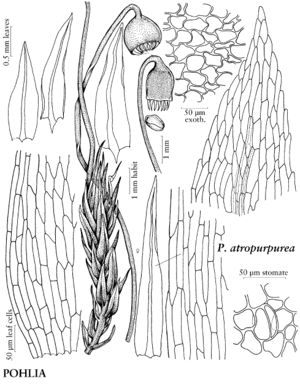Difference between revisions of "Pohlia atropurpurea"
Acta Soc. Fauna Fl. Fenn. 16(5): 14. 1899.
FNA>Volume Importer |
FNA>Volume Importer |
Revision as of 22:02, 16 December 2019
Plants very small, green to reddish, shiny. Stems 0.2–0.4 cm. Leaves erect-spreading to spreading, lanceolate, 0.6–1.2 mm; base not or scarcely decurrent; margins weakly serrulate in distal 1/3; costa ending well before apex; distal medial laminal cells laxly and broadly rhomboidal, 65–110 × 10–12 µm, walls thin. Specialized asexual reproduction absent. Sexual condition dioicous; perigonial leaves to 3 mm; perichaetial leaves scarcely differentiated, lanceolate. Seta orange-brown. Capsule inclined ± 180°, brown to red-brown, sometimes stramineous, short-pyriform to urceolate, neck less than 1/3 urn length; exothecial cells isodiametric, walls sinuate; stomata superficial; annulus absent; operculum short- to long-conic; exostome teeth dark brown to red-brown, triangular-acute; endostome yellow to yellow-brown, basal membrane 1/2 exostome length, segments tapered apically, distinctly keeled, broadly perforate, cilia long, nodulose. Spores 15–21 µm, finely roughened.
Phenology: Capsules mature spring (Apr–Jun).
Habitat: Disturbed clay or rarely sandy soil, path banks, along streams
Elevation: low elevations
Distribution

B.C., Man., Nfld. and Labr., Ont., Yukon, Alaska, Calif., Idaho, Iowa, Minn., N.Y., Wash., Europe.
Discussion
Pohlia atropurpurea has sporophytes similar to those of P. melanodon, with dark reddish brown exostome teeth, yellow endostomes, and immersed stomata. This uncommon northern species is very small and soft, generally consisting of unbranched gametophytes that do not form extensive cushions. As in P. melanodon, the laminal cells are lax and thin-walled. Genetic relationships between this species and P. melanodon need study; P. atropurpurea could be a northern form of that species. Medial laminal cells of the perichaetial leaves are narrower than the broadly lax cells of proximal stem leaves. The exothecial cell walls of capsules of this species are somewhat collenchymatous.
Selected References
None.
